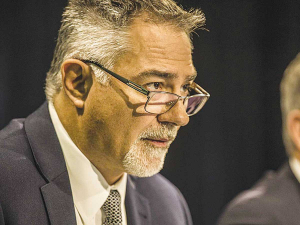Battle for milk
OPINION: Fonterra may be on the verge of selling its consumer business in New Zealand, but the co-operative is not keen on giving any ground to its competitors in the country.
 Fonterra's chief financial officer Marc Rivers says the improved rating outlook reflects the co-op's work improving its balance sheet over the last few years.
Fonterra's chief financial officer Marc Rivers says the improved rating outlook reflects the co-op's work improving its balance sheet over the last few years.
Fonterra's strategic review following two years of financial losses has received a tick of approval from ratings agency Fitch.
This month Fitch Ratings revised the co-operative’s outlook to stable from negative and reaffirmed its ‘A’ rating.
In a statement to NZX, Fonterra chief financial officer Marc Rivers says the improved outlook rating reflects the co-op’s progress following a strategic review.
“In particular, the work we’ve done to improve our balance sheet over the last few years,” he says.
Fitch says its key rating drivers included significant progress the co-op made refocusing on its core New Zealand dairy business.
“This has helped the co-operative retain its defensive traits, which previously underpinned the rating.
“Fonterra can pass on global dairy-price and foreign-exchange movements to farmers in its global ingredient business, and benefits from resilient profit margins in the consumer and food-service business when dairy prices are low. These reduce profit volatility and maintain its leverage metrics.”
Fonterra has been divesting non-core foreign assets and implemented a number of cost-cutting measures in its core business to address its profit volatility.
In 2019, it sold iconic ice cream maker Tip Top to Froneri, a joint venture between Nestle and PAI Partners for $380 million. Last year, it offloaded stakes in DFE Pharma and Foodspring for $623 million.
This financial year the co-op hopes to complete the sale of China Farms for $555m.
Fitch notes that Fonterra’s completed asset sales are in line with its target to reduce gross debt by $1 billion.
As a result, leverage declined to 1.7x in financial year 2020 (FY19: 2.2x) and Fitch expects leverage to remain around this level over the medium term.
Fitch has not included any potential divestments in its base case but notes that Fonterra continues to sell off its stake in Beingmate, while DPA Brazil remains under strategic review and may also be sold.
On Covid’s impact on Fonterra, Fitch says the pandemic and civil unrest in markets such as Hong Kong and Chile had some impact on Fonterra’s business in FY20.
But Fitch expects the impact on Fonterra’s core ingredient business to be limited, as global dairy sales remain resilient.
“Fonterra’s consumer and food-service division may, however, recover slowly, as the hospitality sector across many markets remains dampened by the restrictions to manage the pandemic,” it says.
Meadow Fresh has created the world's first fantasy sports league powered by real cows.
This year, 'Foodie February' sees potatoes take the spotlight as one of New Zealand's most powerful and versatile food heroes.
A multi-cultural team is helping to establish one of New Zealand's largest plantings of premium eating grapes - while learning each other's languages and cultures along the way.
The World Wide Sires National All Day Breeds Best Youth Camp Best All Rounder plaudit has become family affair, with 2026 Paramount Cup winner Holly Williams following in her sister Zara's footsteps.
DairyNZ is giving New Zealand farmers a unique opportunity to gain hands-on governance and leadership experience within the dairy sector.
Herd improvement company LIC has posted a 5.2% lift in half-year revenue, thanks to increasing demand for genetics.